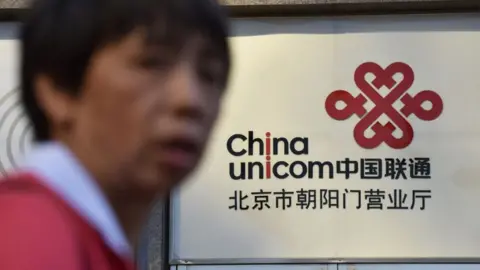NYSE in a spin over Chinese telecoms delistings
 Getty Images
Getty ImagesThe New York Stock Exchange (NYSE) said it will delist three Chinese telecom companies after an earlier reversal of the decision.
The NYSE first announced it would delist China Mobile, China Telecom and China Unicom last week, following a Trump administration executive order.
It then reversed that decision this week, suggesting the order didn't require it to delist the companies.
Now, in a second about-face, the NYSE will delist the companies after all.
The second reversal comes a day after the US Treasury Secretary Steve Mnuchin reportedly raised objections to the NYSE's earlier reversal.
The exchange cited "new specific guidance" from the US Treasury Department as a reason for reverting to its original position.
Trading in the securities will be suspended on 11 January, the NYSE said.
Shares of the three companies have been on a roller coaster ride due to the indecision, falling on the initial announcement, rising on the first reversal and falling again on the second.
Shares in all the companies fell around 8% in Hong Kong, where they are also listed.
"After an intense pressure campaign from those of us who believe we should prioritize the interests of American workers and mom and pop investors above Beijing and Wall Street, I am pleased that the NYSE decided to reverse their earlier announcement," said Republican Senator Marco Rubio.
 Getty Images
Getty ImagesRepublican Senator Ben Sasse, a member of the Senate Select Committee on Intelligence, also agreed with the decision.
"Chinese firms that reject fundamental transparency requirements and have ties to the Chinese military shouldn't benefit from American investment," he said.
NYSE-owner Intercontinental Exchange (ICE) is run by billionaire Jeffrey Sprecher.
His wife Kelly Loeffler, a Senator from Georgia, lost a run-off election for her seat on Tuesday.
More US-China friction
The latest decision comes as the President Trump seeks to cement the US's hard line on China in the final weeks of his presidency.
The decision on the Chinese telecoms giants is based on an executive order he signed in November, which bars American investments in firms which are allegedly owned or controlled by the Chinese military.
On Tuesday Mr Trump signed an additional order banning transactions with eight Chinese apps, including Alipay.
The Wall Street Journal has reported that the White House is considering an additional ban on Alibaba and Tencent.
The three Telecom companies earn all of their revenue in China and have no significant presence in the US
Like many other large Chinese companies, they have a dual listing in the US and Hong Kong.
There are currently more than 200 Chinese companies listed on US stock markets with a total market capitalization of $2.2tn (£1.6tn).